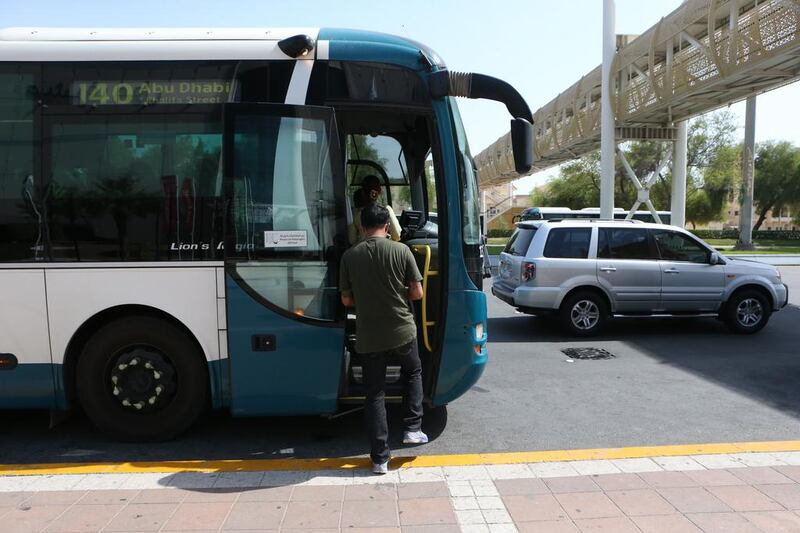ABU DHABI // An automated card system that will make it easier for passengers to pay their bus fare will be introduced in the capital on May 15.
Hafilat, Arabic for buses, will be implemented in phases across the emirate. Card validators will be at bus entrance and exit points. Passengers will scan the Hafilat card when entering and disembarking. Current methods of paying will be phased out.
“There will be a transition period of up to six months to allow passengers to pay by cash or use the Ojra cards within this period,” said Mohammed Bani Malek, the section head of Intelligent Transport Systems Solutions at the Department of Transport.
The new system, which was unveiled on Tuesday, includes a variety of Hafilat cards and smart machines.
“The year 2015 is a year of innovation,” said Mohammed Al Otaiba, acting general manager of the Bus Office at the DoT. “Today the mode share in terms of passenger trips of public transport is 4 per cent, meaning 96 per cent of passenger trips in Abu Dhabi are made via private cars. We envision public transport’s share to increase from 4 to 10 per cent in the next five years.”
Abu Dhabi operates 568 buses across 124 routes. The number of passengers has increased from 3,000 a day in 2007 to more than 100,000.
“Today, the number stands at an average of 125,000 passengers a day, but it varies, depending on the season, and peaks to 145,000,” he said. “You can only imagine the phenomenal growth of the public transport with the increasing number of buses, routes and bus shelters and now, this new automated card system.”
The bus fare is deducted directly from the value of the smart card. It is calculated automatically based on the distance of the passenger’s journey.
The system only allows passengers with cards to board, thus eliminating free rides.
Commuters have the option to purchase temporary or permanent cards, and personalised cards. Cards for students, those with special needs and senior citizens are also available. The cards can be recharged via automated payment machines.
A temporary-use card is valid for 14 days from the date of purchase, and can be recharged up to Dh150 at several locations. It can be used for any bus in the emirate.
Weekly passes are Dh30 and valid for unlimited travel for seven days. Permanent and personalised cards can be recharged to a value of Dh150. A fixed weekly value of Dh30 or a monthly fixed value of Dh80 can be added. These tariffs cover travel only within Abu Dhabi city.
People with special needs and senior citizens can travel for free and student cards are Dh500 per year.
The bus fare within the city is Dh2. Fares to the suburbs start at Dh2, plus 5 fils for each kilometre. The intercity fare is Dh10 plus 10 fils a kilometre.
Ticket offices in all major bus stations will sell the Hafilat cards. DoT has also installed 48 ticket vending machines, 155 reloaders and 11 machines that sell and top up cards in bus stations, bus shelters, customer care centres, shopping malls and hospitals.
“These cards are designed for a multi-modal system,” Mr Bani Malek said. “It will be equipped with additional features including mobile online payments and the ability to pay for other transport-related services.”
rruiz@thenational.ae






